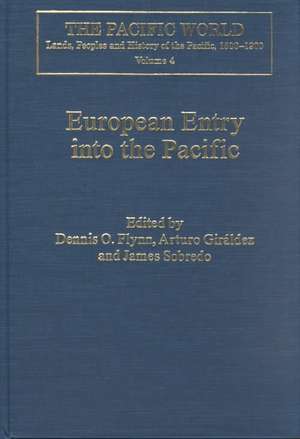European Entry into the Pacific: Spain and the Acapulco-Manila Galleons: The Pacific World: Lands, Peoples and History of the Pacific, 1500-1900
Autor Dennis O. Flynn, Arturo Giráldezen Limba Engleză Hardback – 9 aug 2001
Din seria The Pacific World: Lands, Peoples and History of the Pacific, 1500-1900
- 9%
 Preț: 1315.78 lei
Preț: 1315.78 lei - 35%
 Preț: 1050.34 lei
Preț: 1050.34 lei - 9%
 Preț: 1316.07 lei
Preț: 1316.07 lei - 29%
 Preț: 1348.74 lei
Preț: 1348.74 lei - 38%
 Preț: 687.26 lei
Preț: 687.26 lei - 29%
 Preț: 1357.17 lei
Preț: 1357.17 lei - 29%
 Preț: 1021.20 lei
Preț: 1021.20 lei - 27%
 Preț: 1050.41 lei
Preț: 1050.41 lei - 29%
 Preț: 1248.24 lei
Preț: 1248.24 lei - 33%
 Preț: 362.00 lei
Preț: 362.00 lei - 29%
 Preț: 1077.71 lei
Preț: 1077.71 lei - 29%
 Preț: 1023.21 lei
Preț: 1023.21 lei - 28%
 Preț: 1042.56 lei
Preț: 1042.56 lei - 27%
 Preț: 1050.41 lei
Preț: 1050.41 lei - 28%
 Preț: 1586.14 lei
Preț: 1586.14 lei - 29%
 Preț: 1181.73 lei
Preț: 1181.73 lei
Preț: 1218.63 lei
Preț vechi: 1673.33 lei
-27% Nou
Puncte Express: 1828
Preț estimativ în valută:
233.26€ • 253.46$ • 196.06£
233.26€ • 253.46$ • 196.06£
Comandă specială
Livrare economică 31 martie-14 aprilie
Doresc să fiu notificat când acest titlu va fi disponibil:
Se trimite...
Preluare comenzi: 021 569.72.76
Specificații
ISBN-13: 9780754601524
ISBN-10: 0754601528
Pagini: 436
Dimensiuni: 174 x 246 x 32 mm
Greutate: 0.96 kg
Ediția:1
Editura: Taylor & Francis
Colecția Routledge
Seria The Pacific World: Lands, Peoples and History of the Pacific, 1500-1900
Locul publicării:Oxford, United Kingdom
ISBN-10: 0754601528
Pagini: 436
Dimensiuni: 174 x 246 x 32 mm
Greutate: 0.96 kg
Ediția:1
Editura: Taylor & Francis
Colecția Routledge
Seria The Pacific World: Lands, Peoples and History of the Pacific, 1500-1900
Locul publicării:Oxford, United Kingdom
Cuprins
Contents: Introduction; The galleons in a larger context: Geographical exploration by the Spaniards, Donald D. Brand; The relations of the Chinese to the Philippine Islands, Berthold Laufer; Initiating the galleon trade: The Mediterranean connection, William Henry Scott; Crusade or commerce? Spanish-Moro relations in the 16th century, William Henry Scott; Spain and Spanish trade in Southeast Asia, M. N. Pearson; The Japanese trade and residence in the Philippines: before and during the Spanish occupation, M. T. Paske-Smith; Impacts of the galleon trade through the 17th century: theory and evidence: Plata es sangre: sidelights on the drain of Spanish-American silver in the Far East, 1550-1700, C. R. Boxer; Le Galion de Manille. Grandeur et décadence d’une route de la soie, Pierre Chaunu; Las conexiones e intercambios Americanos con el Oriente Bajo el Marco Imperial Español, Alvaro Jara; The Chinese silk trade with Spanish-America from the late Ming to the mid-Ch’ing period, Han-sheng Chuan; Arbitrage, China, and world trade in the early modern period, Dennis O. Flynn and Arturo Giráldez; Further impacts of the galleon trade: 18th-century Philippine economy: commerce, Maria Lourdes Diaz-Trechuelo; Aventuras asiáticas del peso mexicano, John McMaster; Two and a half centuries of the galleon trade, Benito Legarda, Jr.; Index.
Notă biografică
Flynn, Dennis O.; Giráldez, Arturo
Descriere
World history conventionally ignores or underestimates the importance of Manila, the Manila galleons, and the Philippines as key stages in the development of trans-Pacific contact and of the world economy. Essays in this volume discuss Philippine-Asian exchanges prior to the entry of Europeans, and then look at European influences and the impact of Magellan’s voyage, and the emergence of Manila as one of global trade’s crucial linchpins during four centuries. Linkages between Latin America and China, and Spanish-Japanese competition for the Chinese marketplace are important topics. Tensions and cooperation among Chinese, Japanese, Iberians, Africans, Christians, Muslims and others on Philippine soil are also covered. This volume suggests the need for thorough re-evaluation of the Philippines’ central role in terms of both Pacific history and global history as perhaps the single most important stage in the traffic that linked China and Latin America.
